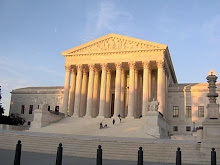A couple of days late on this one, but the Supreme Court has agreed to hear the case of FCC v. Fox Television Stations . In the suit, Fox is challenging the FCC policy that fines radio or television networks for even fleeting, accidental cases of obscene words being uttered on air during the day. The case stems from incidents in which Cher and Nicole Richie (I question the Post's description of Richie as "a celebrity," but that's another topic entirely) said what the Post article refers to as "variations of a vulgar four-letter word."
The case, which will be heard in the fall, will be the Court's first major ruling on broadcast indecency rules since the 1978 FCC v. Pacifica Foundation. That case punished a radio station for airing George Carlin's "Seven Dirty Words" monologue.
I'm very interested in this ruling. While I understand the need for basic broadcast rules and understand that airing shows with "vulgar" language at times when children could be watching isn't necessarily appropriate or necessary, I also believe that sometimes people say "bad" words when they are emotional and stations shouldn't face heavy fines for it. The cases mentioned in the article deal with celebrities saying one word in the context of winning an award. The word in question, referred to in "A Christmas Story" as "The F dash dash dash word," isn't meant to refer to a sexual act when used in that context. It's used for emphasis and sometimes, it just slips out. The question of whether stations should face enormous fines when someone slips up on an awards show or during a sporting event is an interesting one. ...
The Washington Post article I linked mentions an incident in 2004 in which television stations decided not to air "Saving Private Ryan" on Veterans Day because of fears that the movie's language could lead to FCC fines. The FCC refused to say before hand whether the stations would be fined . In 2005, the FCC ruled that the movie was not indecent, a decision I absolutely agree with.
My argument at the time was (and still is) that stations should have been able to air the film without fear of retribution. The language is necessary in the historical context of the film, and editing out the "obscenities" would make it less realistic. A romantic comedy with edited language is still funny; a war film in which soldiers say "darn" or "freaking" does not paint an accurate picture of what would really happen in the war zone.
A few weeks ago, Jane Fonda had to apologize for using the word "cunt" during a live broadcast of "The Today Show." She used the word because it is the title of a piece she was performing in her role in "The Vagina Monologues." I'm using it because I think that banning words only gives them more power and refusing to print a word even in the context of a conversation about that word is illogical. Whenever someone slips a curse word on TV or a politician refers to another leader with less-than-polite language, media struggle to report the "story" without actually saying or printing the word in question. The question we should be asking, and what I think the Supreme Court will address, is whether or not words used accidentally or in the context of the title of the show the person is promoting should mean huge fines and hurried apologies.
While it is true that parents can't control what their children hear on live television, kids are just as likely to hear cuss words out and about in town as they are from a celebrity or politician who lets one slip on TV. Having an open an honest discussion with your child about which words are and are not appropriate to say in public (or in your home) seems a much better approach. The more shame and stigma placed on a behavior, the more interesting it seems to a kid.
Although the rules against airing certain words are meant to protect children, it is ludicrous to think that a child who is mature enough to watch "Saving Private Ryan" is not also mature enough to hear the language without suffering some type of irreparable damage. I've always argued that the same thing goes for the limited use of obscenities in newspapers — kids who are old enough to want to read the newspaper are old enough to know that you don't just run down the street screaming bad words at the top of your lungs.
Because it's funny, related to the last Supreme Court ruling on this issue, and because I believe in free speech, I present to you, George Carlin with a grammar nerd's version of "the seven dirty words you can't say on television." If you aren't familiar with this, you should be aware that it is potentially offensive and NOT SAFE FOR WORK.


No comments:
Post a Comment